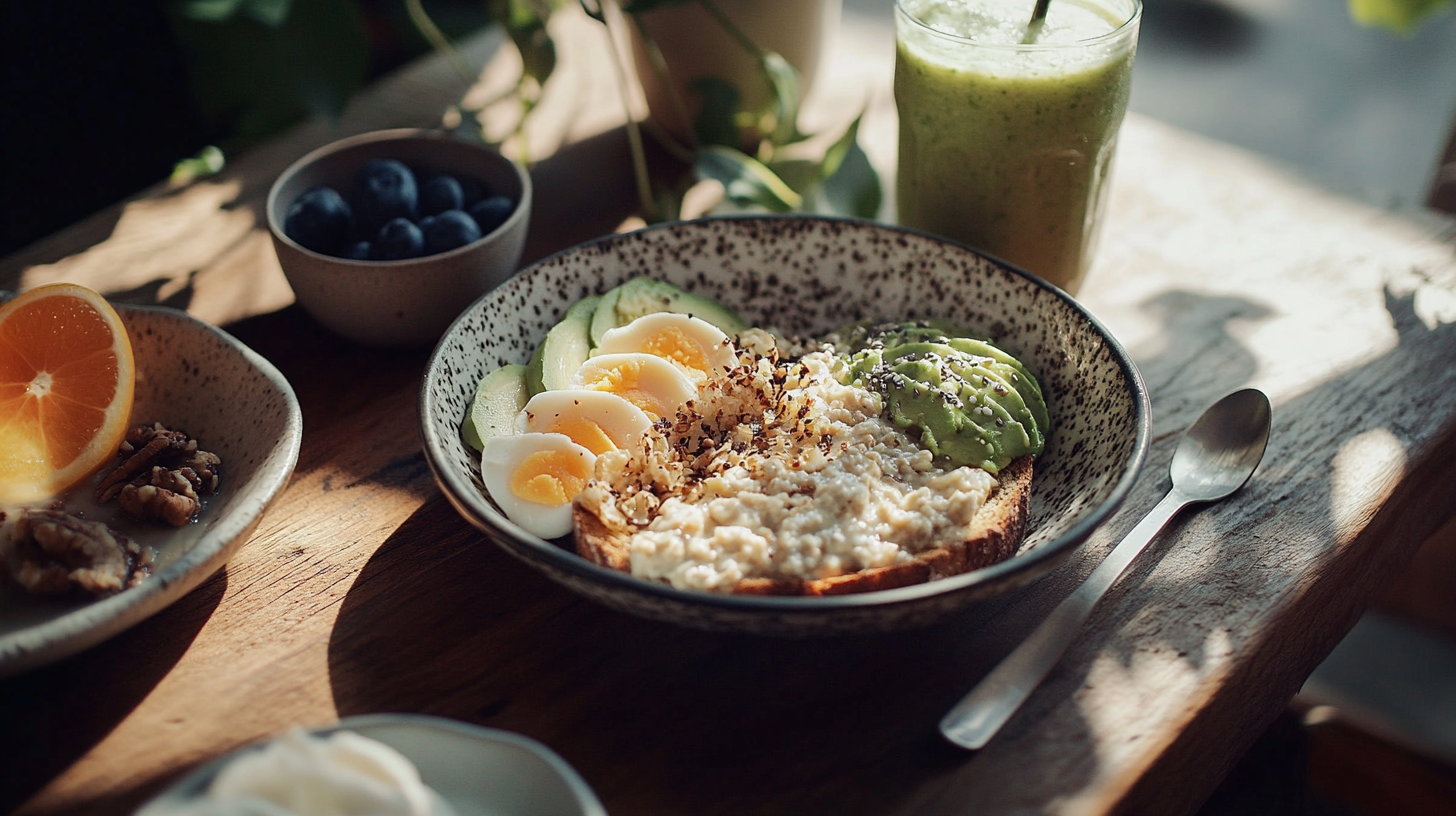Living with GERD (Gastroesophageal Reflux Disease) can be a real challenge—especially in the mornings. You want to fuel your body, but the wrong breakfast can leave you with heartburn or discomfort for hours. That’s where these delightful breakfast recipes for GERD come in. This guide is your go-to for soothing, satisfying meals that won’t mess with your digestion. Whether you’re newly diagnosed or just trying to eat more mindfully, we’ll walk through exactly what you should eat, what to avoid, and how to make mornings way easier (and tastier).
Table of Contents
What is GERD and Why Breakfast Matters
So what exactly is GERD? It’s a chronic condition where stomach acid frequently flows back into the esophagus, causing discomfort like heartburn. Sounds awful, right? But here’s the kicker—what you eat, especially first thing in the morning, can either calm it or crank it up.
Breakfast recipes for GERD should be low-acid, low-fat, and not spicy. Why? Because high-fat foods take longer to digest and can relax the lower esophageal sphincter, letting acid sneak up. Breakfast matters because it sets the tone for your entire digestive day. Skip it, and you might find yourself overeating later—triggering symptoms. Eat the wrong thing, and you’re stuck with reflux before your coffee’s even cooled off.
How to Choose GERD-Friendly Breakfast Foods
If you’re staring at your pantry wondering what’s safe, you’re not alone. A GERD-safe breakfast doesn’t have to be boring—it just needs to avoid the usual suspects. That includes high-fat dairy, fried foods, acidic fruits like oranges, and spicy breakfast meats. Instead, choose low-acid fruits (like bananas and melons), whole grains, and lean proteins.
When building breakfast recipes for GERD, focus on:
- Soft textures that are gentle on your gut
- Mild, natural flavors
- Low-acidity ingredients
- Fiber-rich additions like oats and chia
We’ll cover specific recipe ideas soon, but first—let’s dive into what NOT to toss into your skillet.
Ingredients to Avoid for GERD Sufferers
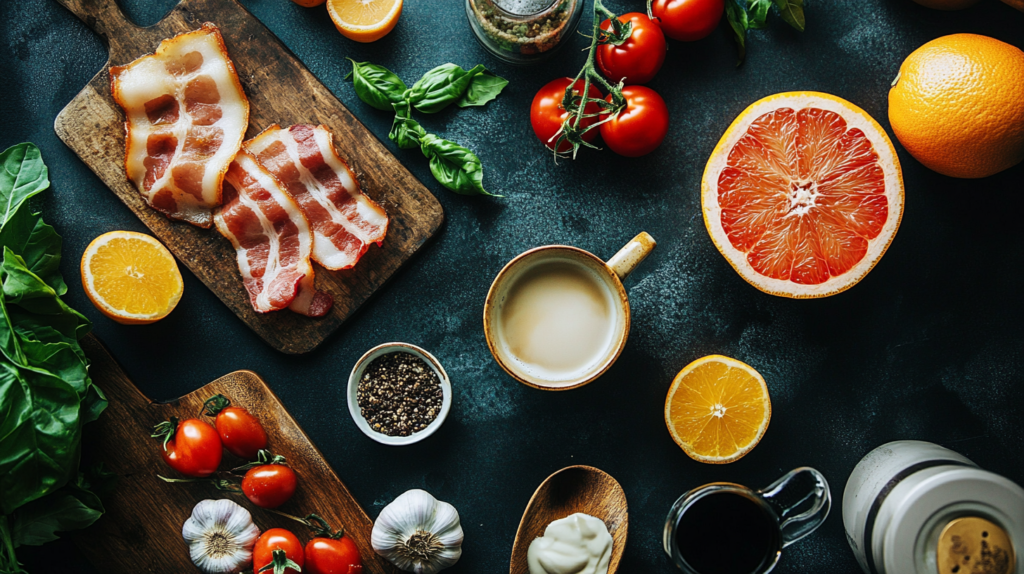
Even healthy ingredients can cause problems for GERD folks. Here are a few big offenders you’ll want to skip when crafting breakfast recipes for GERD:
- Citrus fruits (oranges, grapefruits, lemons)
- Tomatoes (including sauces and juices)
- Peppermint (it relaxes the esophageal sphincter)
- Fried or greasy foods
- High-fat meats like bacon or sausage
- Onions and garlic (especially raw)
- Full-fat dairy (can slow digestion)
Think of these as your breakfast “no-go” list. Keep them out of your morning and your stomach will thank you.
Top Ingredients That Soothe GERD
Good news: not all food is the enemy. There are plenty of ingredients that can actually help you manage GERD symptoms when used in breakfast recipes for GERD. These foods are gentle, alkalizing, and easy to digest:
- Bananas – low-acid and rich in fiber
- Melons – hydrating and mild
- Oats – fiber-packed and filling
- Chia seeds – anti-inflammatory and digestion-friendly
- Almond milk – alkaline and dairy-free
- Ginger – known to calm the digestive system
- Egg whites – high-protein without the fat
These stars will show up throughout the recipes later, helping you build a GERD-friendly breakfast that’s delicious and smart.
Nutritional Guidelines for GERD Breakfasts
Creating breakfast recipes for GERD isn’t just about dodging acidic ingredients. It’s also about building meals that give your body what it needs—without the burn. That means thinking in terms of nutrition as much as flavor.
The key elements to prioritize:
- Low-fat content: Fats slow digestion and encourage reflux. Choose lean proteins, like egg whites or turkey, and avoid cooking with butter or cream.
- Complex carbs: Think oats, whole wheat toast, or brown rice. These digest slowly and keep you full longer without triggering symptoms.
- Moderate fiber: While fiber is good, too much at once can cause bloating. Balance it out with soothing ingredients.
- No carbonation or caffeine: We know, ditching coffee is hard. Try caffeine-free teas like chamomile or ginger instead.
When you follow these principles, your breakfast recipes for GERD won’t just be safe—they’ll also be satisfying.
The Role of Fiber in Managing GERD Symptoms
Fiber is a double-edged sword. It’s crucial for gut health, but if you overdo it or get it from the wrong sources, you might irritate your system. Soluble fiber is your best bet—it slows digestion and can absorb excess acid.
Top soluble fiber sources for breakfast recipes for GERD:
- Oats
- Bananas
- Chia seeds
- Apples (peeled)
- Sweet potatoes
Avoid fibrous peels or raw roughage first thing in the morning. That’s a fast track to discomfort. Instead, go for soft, cooked, or blended options.
A gentle oatmeal or banana-chia bowl can be a fiber-rich dream that actually calms your stomach rather than stirring it up.
Oatmeal with Banana & Chia Seeds
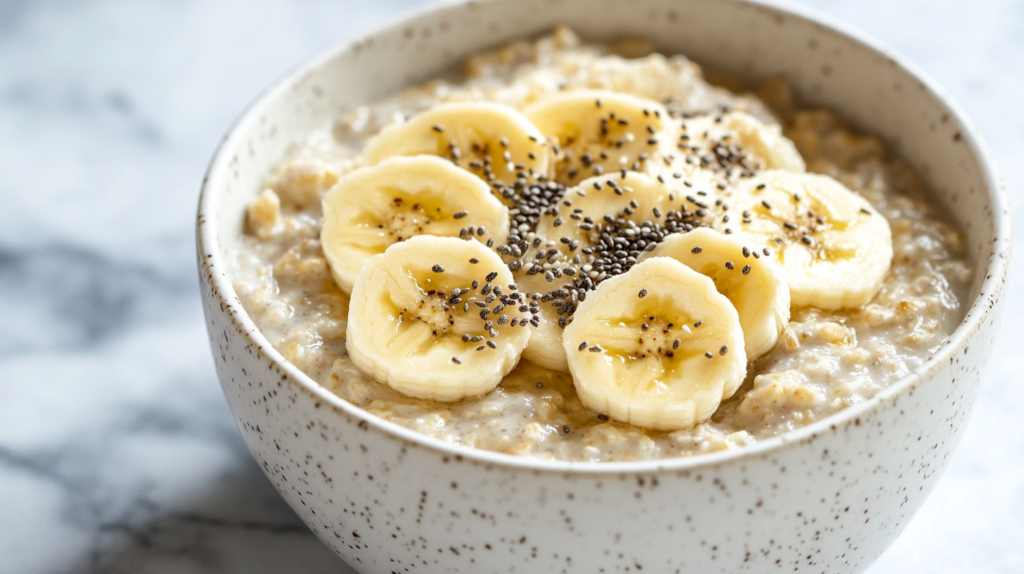
Let’s kick things off with a classic that hits every GERD-friendly mark. This recipe is creamy, naturally sweet, and full of fiber—all while being gentle on your system.
Why It’s Great for GERD
Oats are soothing, bananas are low-acid, and chia seeds offer anti-inflammatory benefits. This combo delivers lasting energy without triggering symptoms.
Prep Time: 5 mins
Cook Time: 5 mins
Total Time: 10 mins
Servings: 1
Ingredients:
- ½ cup rolled oats
- 1 cup almond milk (unsweetened)
- 1 ripe banana, sliced
- 1 tbsp chia seeds
- Dash of cinnamon (optional)
- Maple syrup or honey to taste (optional and only in small amounts)
Instructions:
- In a small pot, bring almond milk to a gentle simmer.
- Stir in oats and cook on low for 4–5 minutes, stirring occasionally.
- Add chia seeds and cinnamon, mix well.
- Pour into a bowl, top with sliced bananas.
- Drizzle with a touch of syrup if desired.
You can make this in advance and reheat it with a splash of almond milk for busy mornings. This is one of the easiest breakfast recipes for GERD that you’ll actually look forward to eating.
✅ Related Recipe Tip: Want more ideas like this? Check out these chicken breakfast recipes that fit well into a GERD-safe diet when made with lean meats and mild spices.
GERD-Friendly Scrambled Eggs with Veggies
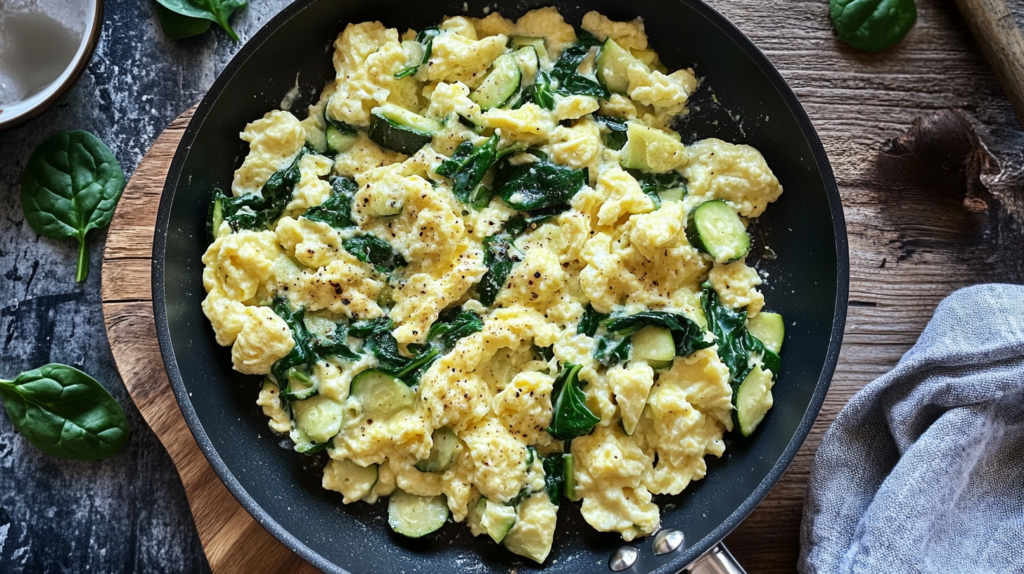
Not all eggs are created equal—especially when it comes to GERD. But when you skip the butter, keep the yolks minimal, and add gut-friendly veggies, scrambled eggs can become one of the best breakfast recipes for GERD.
A Comforting Protein-Rich Option
Eggs provide quality protein, but the yolks are high in fat, which can worsen reflux. So this version uses mostly egg whites, cooked with gentle ingredients like spinach and zucchini. Plus, you skip the greasy pan and go light on oils.
Prep Time: 5 mins
Cook Time: 7 mins
Total Time: 12 mins
Servings: 1
Ingredients:
- 2 egg whites + 1 whole egg
- ½ cup chopped zucchini
- ½ cup baby spinach
- 1 tsp olive oil
- Pinch of salt (or skip for low-sodium)
- 1 tbsp dairy-free cheese (optional)
Instructions:
- Heat olive oil in a non-stick skillet over medium-low heat.
- Add zucchini and cook until tender, about 3–4 minutes.
- Add spinach and cook until wilted.
- Beat the egg whites and egg together, then pour into the skillet.
- Stir gently, cooking until just set.
- Top with cheese if using, and serve warm.
This dish feels hearty but sits light. It’s one of those breakfast recipes for GERD that satisfies the need for something savory without tipping your acid levels.
✅ Need low-sodium chicken inspiration? Add a small serving of sliced lean chicken breast to this scramble for extra protein. Check out these low-sodium chicken recipes for smart ideas.
Smoothie Bowl with Melon and Ginger
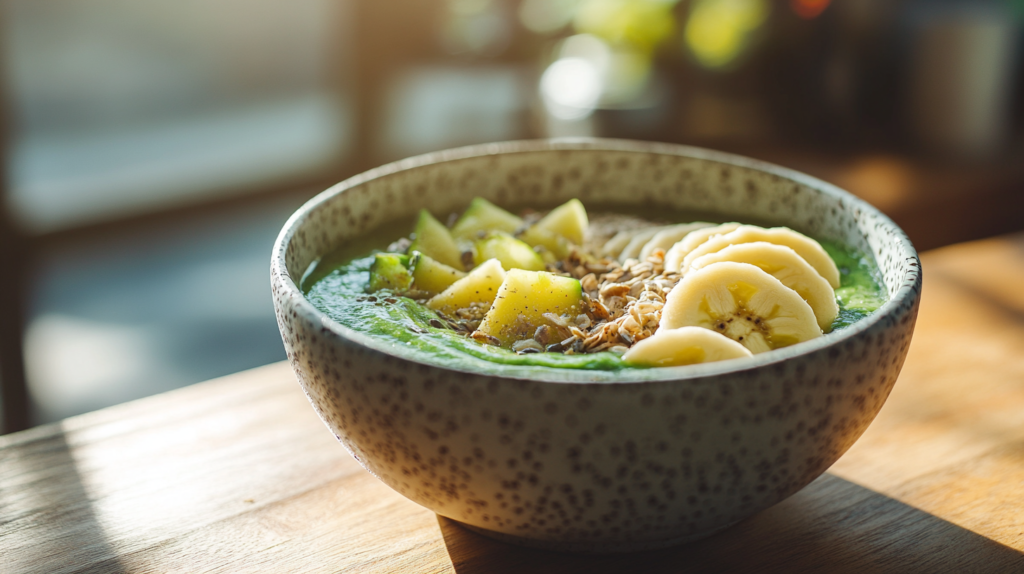
Smoothie bowls are trendy, but many are loaded with acidic fruits like berries and citrus—not great for reflux. This version keeps it mellow, alkaline, and still full of flavor.
Cooling and Soothing for Morning Relief
Melons are high in water content and low in acid. Ginger is a well-known digestive aid. Together, they make this one of the most refreshing breakfast recipes for GERD that still delivers on taste.
Prep Time: 5 mins
Cook Time: 0 mins
Total Time: 5 mins
Servings: 1
Ingredients:
- 1 cup honeydew or cantaloupe, cubed
- ½ banana
- ½ cup unsweetened almond milk
- ½ tsp grated fresh ginger
- 1 tbsp chia seeds
- ¼ cup rolled oats (optional for texture)
- Toppings: banana slices, oats, melon balls
Instructions:
- In a blender, combine melon, banana, almond milk, and ginger.
- Blend until smooth and creamy.
- Pour into a bowl, top with chia, sliced banana, and extra melon.
- Add oats for extra texture or fiber if desired.
If you’re bored with toast or oatmeal, this smoothie bowl is a vibrant change of pace—and totally safe when following breakfast recipes for GERD.
✅ Bonus Link: Want other breakfasts designed for sensitive diets? These PCOS breakfast ideas and candida breakfast recipes share a similar low-inflammatory vibe that’s GERD-friendly too.
Whole Wheat Toast with Avocado & Turkey
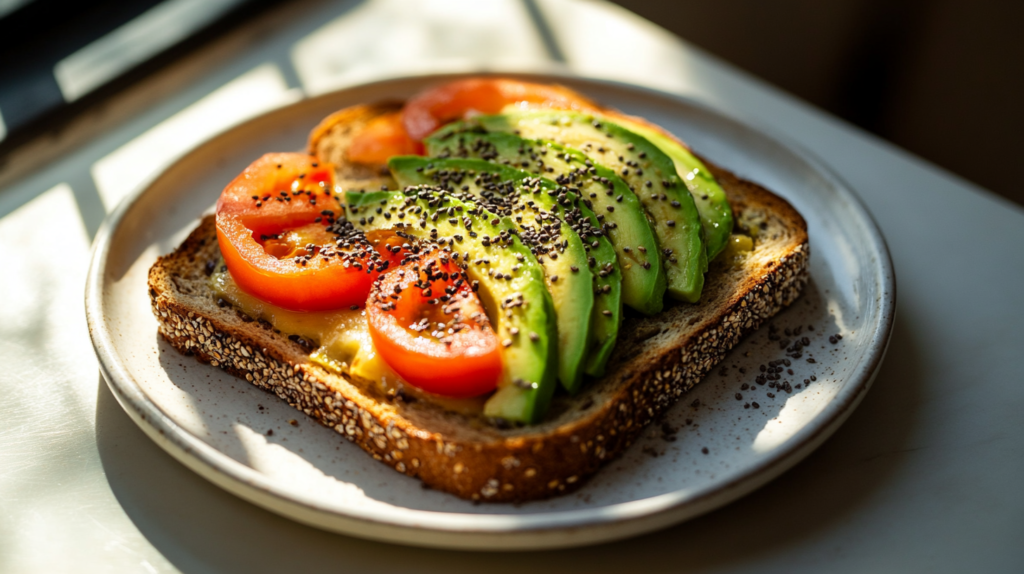
Toast doesn’t have to be boring—and it doesn’t have to trigger reflux, either. When done right, it’s one of the most satisfying breakfast recipes for GERD. We skip the butter and reach for creamy avocado and lean turkey instead.
Balanced, Savory and Easy on the Stomach
Avocado provides healthy fats that are less likely to cause issues in moderation. Paired with low-sodium, skinless turkey breast, this is a simple, protein-packed breakfast that’s friendly to your stomach.
Prep Time: 5 mins
Cook Time: 2 mins
Total Time: 7 mins
Servings: 1
Ingredients:
- 1 slice whole wheat bread
- ¼ avocado, mashed
- 2–3 slices of lean turkey breast
- Sprinkle of chia seeds (optional)
- Dash of black pepper (optional)
Instructions:
- Toast the bread lightly (avoid overly crispy edges).
- Spread mashed avocado evenly over toast.
- Layer on turkey slices.
- Sprinkle chia seeds or pepper if desired.
The result? A savory, filling breakfast you can prep in minutes. This recipe ranks high among breakfast recipes for GERD because it’s flavorful, low-acid, and nutrient-dense without being heavy.
✅ Love sandwiches? Don’t miss these chicken cutlet sandwich recipes—just skip the spicy sauces and fried options to keep it GERD-friendly.
Lifestyle Tips for Managing Morning GERD
Your breakfast choices matter—but so does how you eat and what you do afterward. Here are a few essential tips to boost the effectiveness of your breakfast recipes for GERD:
- Eat slowly and chew thoroughly: Rushing increases swallowed air and poor digestion.
- Stay upright after eating: Don’t lie down or lounge on the couch. Stay vertical for at least 30–60 minutes.
- Watch your portion size: Smaller meals help reduce pressure on the stomach.
- Time your breakfast right: Wait at least 30 minutes after waking if you had a late-night meal.
- Sip, don’t chug: Stick to room-temperature water or herbal tea with breakfast—skip cold drinks.
Even the best breakfast recipes for GERD won’t work if you’re constantly slouching or overstuffed. These small lifestyle shifts can make a huge difference.
Foods to Prep Ahead for GERD-Safe Mornings
Not a morning person? No worries—there are plenty of breakfast recipes for GERD that are easy to prep ahead and grab on the go.
Some top options:
- Overnight oats with almond milk and banana
- Mini egg white muffins with zucchini
- Smoothie packs (frozen melon, banana, and ginger cubes ready to blend)
- Homemade low-acid granola with chia and oats
These make your morning easier while sticking to your GERD-safe plan.
✅ Looking for variety? These irresistible AIP breakfast recipes align with many GERD principles—especially low-inflammation, gut-calming meals.
Common Mistakes to Avoid in GERD Breakfasts
You might be doing everything “mostly right” but still getting symptoms. That’s often because of a few sneaky habits or overlooked ingredients that mess up even GERD-safe meals. Let’s clear the air and keep your breakfast recipes for GERD as safe as they are tasty.
Mistake 1: Rushing Your Meal
If you’re inhaling your breakfast in under five minutes, that’s a problem. Eating too fast leads to excess air intake, bloating, and poor digestion—basically a GERD flare waiting to happen.
Mistake 2: Skipping Breakfast Entirely
Skipping meals seems like a way to reduce symptoms, but it can actually worsen GERD. An empty stomach increases acid production. Instead, go light with one of the simpler breakfast recipes for GERD like a banana-oat bowl or melon smoothie.
Mistake 3: Coffee First Thing in the Morning
We get it—coffee is life. But for people with GERD, it’s often one of the biggest triggers. Try replacing it with caffeine-free alternatives like herbal tea (chamomile and ginger are both great).
Mistake 4: Using Acidic Toppings
Watch those “extras.” Even a drizzle of orange juice in a smoothie or a dollop of yogurt can push your meal into the acid danger zone. Stick to low-acid, plant-based toppings.
If you’ve been following breakfast recipes for GERD and still feel discomfort, chances are one of these habits is sneaking into your routine.
When to Eat: Timing Your GERD-Friendly Meal
Believe it or not, when you eat matters almost as much as what you eat. Here’s how to time your breakfast recipes for GERD for the best results:
- Avoid eating immediately after waking up, especially if you had a late dinner. Give your body 20–30 minutes to settle.
- Don’t lie down after breakfast—this includes napping or lounging. Stay upright for at least 30–60 minutes to allow gravity to aid digestion.
- Space your meals throughout the day. GERD responds better to smaller, more frequent meals rather than big gaps followed by large portions.
- Hydrate before meals instead of during. Drinking a large glass of water with food can increase stomach pressure and reflux.
Timing may seem simple, but pairing it with the right breakfast recipes for GERD can really upgrade your digestive comfort.
✅ Meal planning helps! If you want more organized ideas for busy mornings, check out these breakfasts for weight loss—many follow GERD-friendly principles too.
Frequently Asked Questions (FAQs)
1. What are the best breakfast recipes for GERD?
The best breakfast recipes for GERD are low in fat and acid, high in soluble fiber, and easy to digest. Great examples include oatmeal with banana, egg whites with spinach, or a melon-ginger smoothie bowl. Avoid spicy, fried, or citrus-heavy options.
2. Is oatmeal safe to eat with GERD?
Yes, oatmeal is one of the top breakfast recipes for GERD. It’s rich in soluble fiber, which absorbs acid and helps move food smoothly through your digestive tract. Just avoid toppings like citrus, chocolate, or whole milk.
3. Can I have eggs for breakfast if I have GERD?
Eggs can be safe in breakfast recipes for GERD—just stick with egg whites or use minimal yolk. Avoid frying them or adding heavy cheese, onions, or peppers. Scrambled egg whites with soft veggies work great.
4. What fruits are safe for GERD-friendly breakfasts?
Low-acid fruits like bananas, melons (honeydew or cantaloupe), and peeled apples are ideal. They blend well into breakfast recipes for GERD without irritating your stomach. Steer clear of oranges, grapefruits, and berries.
5. Can I drink smoothies with GERD?
Absolutely—just avoid acidic fruits and dairy. Instead, blend low-acid options like banana and melon with almond milk and ginger. Smoothies are a great base for gentle breakfast recipes for GERD if made properly.
6. Is toast good for GERD in the morning?
Whole wheat toast with avocado or lean protein is a GERD-friendly choice. Just skip the butter and acidic spreads. Toast is one of the most customizable breakfast recipes for GERD when topped with gut-friendly ingredients.
7. How can I meal prep GERD-safe breakfasts?
Make overnight oats, pre-blended smoothie packs, or egg-white muffins ahead of time. This keeps you consistent and avoids rushed, trigger-heavy meals. Prepping safe breakfast recipes for GERD ensures you start every day comfortably.
8. What is the best breakfast for GERD?
The best breakfast for GERD combines low-fat, low-acid, and high-fiber elements. Oatmeal with bananas, scrambled egg whites with veggies, or a smoothie with melon and ginger are all excellent choices. They soothe rather than spark reflux symptoms.
9. What’s good for GERD in the morning?
Gentle, easy-to-digest foods are best. Think: soft-cooked oatmeal, toast with mashed avocado, egg whites, or a low-acid fruit smoothie. These breakfast recipes for GERD give you energy without the burn.
10. What to eat first thing in the morning if you have acidity?
Start your day with something light and soothing like a banana, warm oatmeal, or a melon smoothie. These ingredients help reduce acidity and settle your stomach. Avoid acidic fruits, coffee, and fried foods.
11. Are eggs ok for GERD?
Eggs are okay if you focus on the whites, which are low-fat and less likely to trigger reflux. Avoid frying and heavy cheese. Scrambled egg whites with soft veggies are one of the safest breakfast recipes for GERD.
Conclusion
Managing GERD doesn’t mean you have to give up delicious, satisfying breakfasts. With the right ingredients and mindful timing, breakfast recipes for GERD can be comforting, energizing, and totally symptom-free. Whether you’re into savory egg scrambles or sweet oat bowls, there’s no shortage of GERD-friendly ideas that fit into your lifestyle.
Just remember: it’s not only about what you eat, but how and when you eat it. Choosing low-acid, low-fat meals and keeping your morning routine gentle can make a huge difference. And don’t be afraid to prep ahead or explore variety. Try that melon smoothie. Swap your toast toppings. Ditch the morning coffee for chamomile. Tiny changes = big relief.
Still exploring ways to switch up your mornings? You can check out more tailored ideas like these chicken breakfast recipes or even broader wellness-focused guides like breakfasts for weight loss.
Your mornings should fuel you—not fight you.
Which GERD-friendly breakfast will you try first? Let us know in the comments or share your go-to meal!

